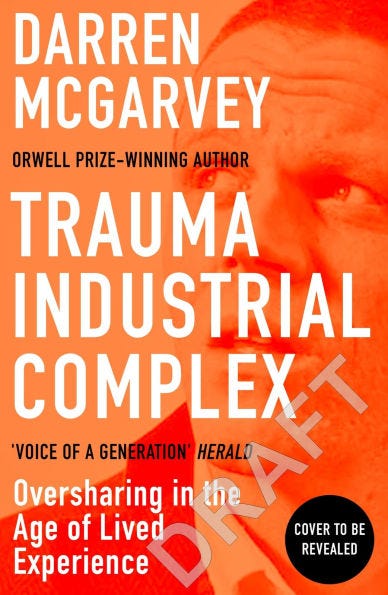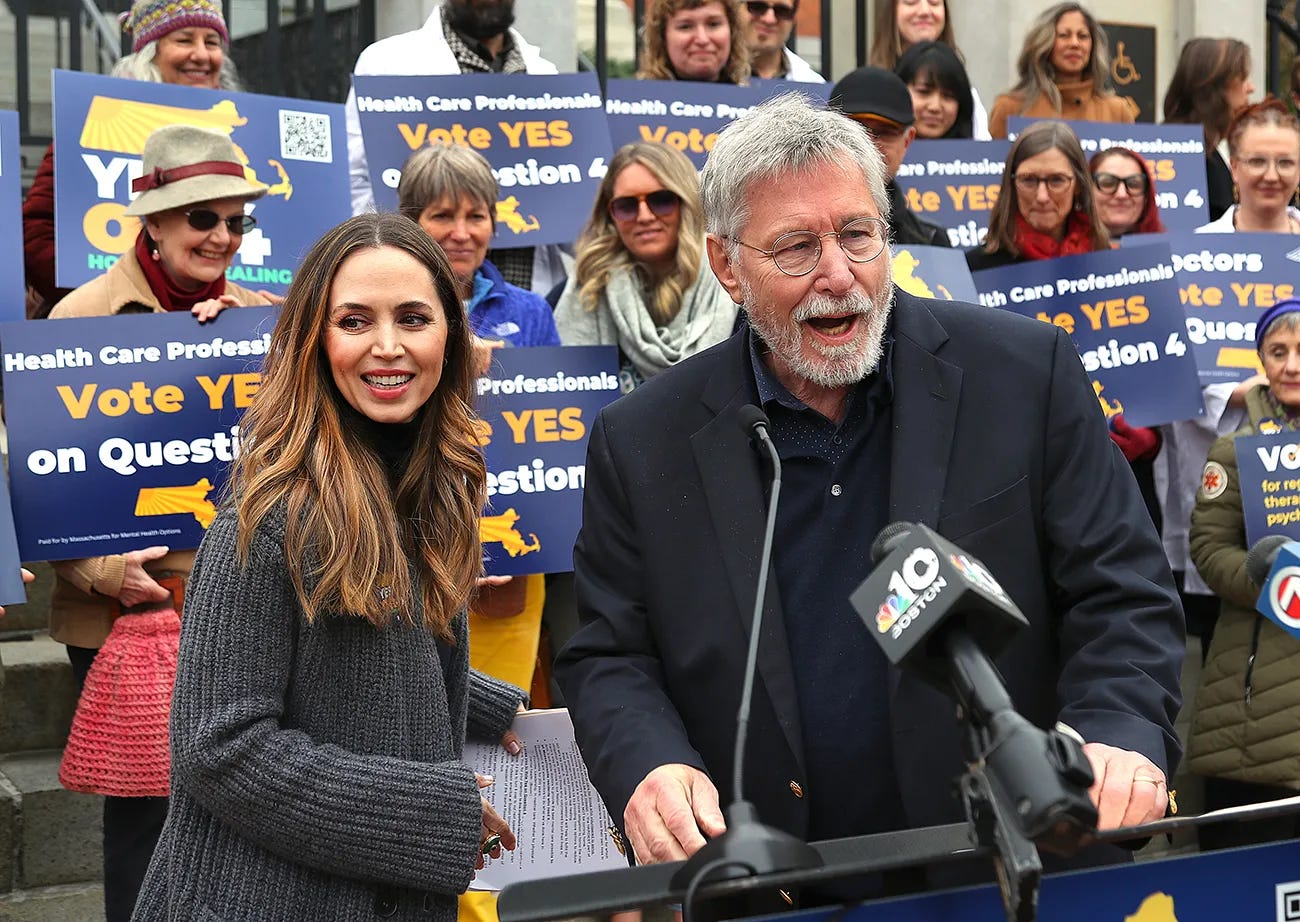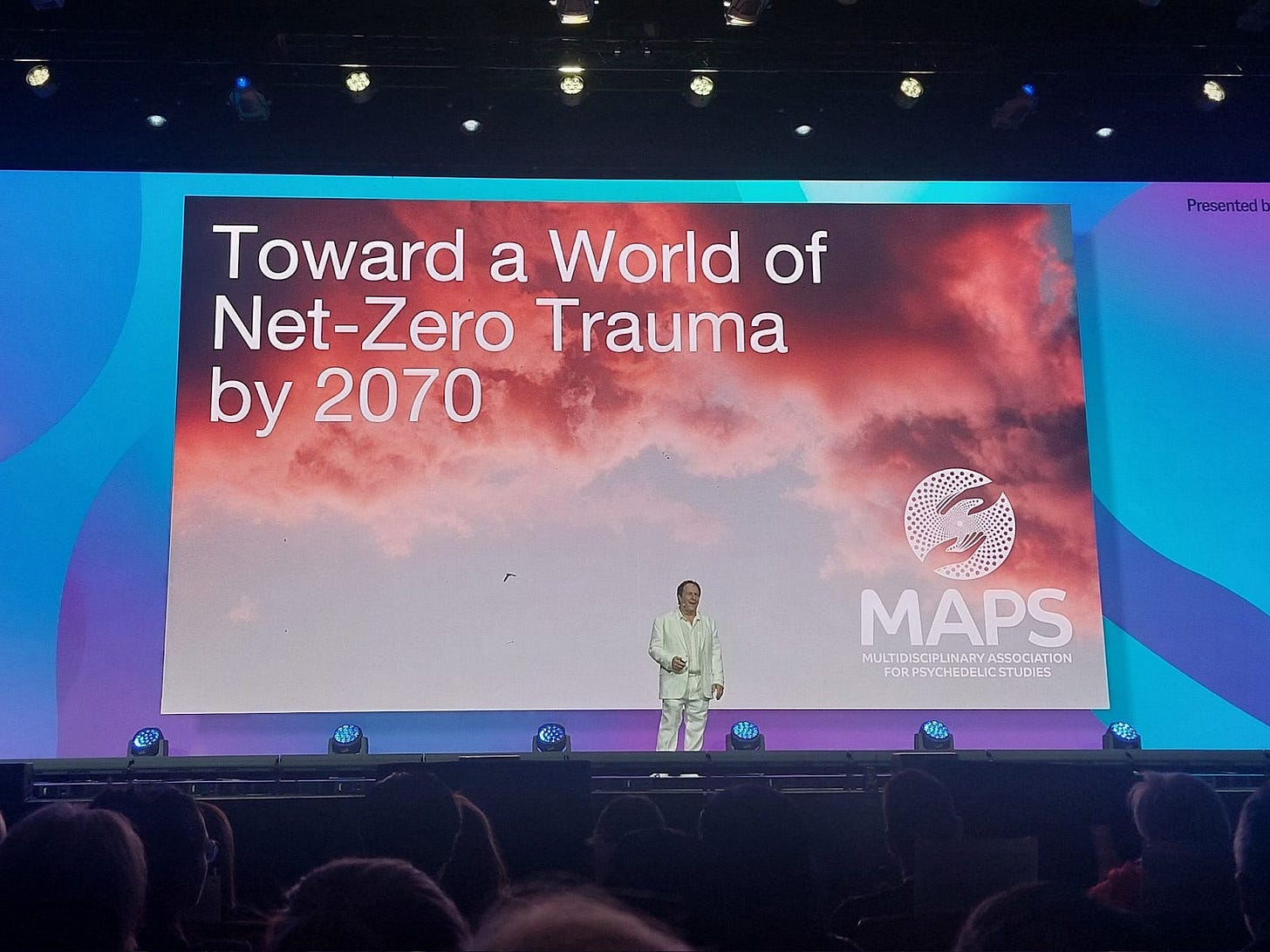Psychedelics and the Trauma Industrial Complex
Trauma is the cultural fishbowl in which we swim. What would it be like outside of it?
A new book published today by Darren McGarvey, called The Trauma Industrial Complex (great title), casts a critical eye on the overwhelming dominance of ‘trauma-speak’ in modern western culture.
McGarvey defines the Trauma Industrial Complex as
the system in which the very real and urgent issue of mass unacknowledged, untreated trauma is commodified, medicalised and repackaged for profit, validation and influence
McGarvey was the author of a best-selling 2017 book called Poverty Safari: Understanding the Anger of Britain’s Underclass. It recounted McGarvey’s brutal experiences growing up in a Glasgow sink estate, giving middle-class readers a…well, a poverty safari of what life is like in the underclass. Middle-class lefties absolutely loved the book - it won the Orwell Prize, while McGarvey was elected a fellow of the Royal Society of Literature and asked to deliver a BBC Reith Lecture. ‘Tell us how awful it was Darren, was it ghastly? I simply can’t imagine…’
But at some point in this media blitz, as he recounted his ‘raw personal story of deprivation’ for the umpteenth time, McGarvey started to feel something was wrong, that his story was being commodified - that he had commodified himself.
He became acutely aware that ‘lived experience’ has become a hot currency, leading to all sorts of lucrative opportunities in media, academia, NGOs, business and politics. But all those opportunities create an incentive to present his story a certain way, as a simple narrative of heroic recovery, when he might not have fully recovered at all (and in fact, he recounts how the pressure of all the media attention led to him relapsing and going on a drugs binge).
More broadly, McGarvey questions the excessive prominence that we give to lived experience and trauma testimonies over other forms of evidence, and he notes that some trauma stories are worth more than others (on the left, BIPOC and trans lived experience are highest currency, on the right, veterans).
McGarvey has become wary of the way trauma stories can be used by political and social movements, and is now detaching himself from ‘the trauma industrial complex’ to focus on his personal recovery (after the book tour, naturally).
This topic has a lot of relevance to the psychedelic renaissance, which has been deeply shaped by trauma culture through figures like Bessel Van Der Kolk and Gabor Mate, the two high-priests of the Cult of Trauma. Veterans’ trauma testimonies played a key role in psychedelic lobbying for decriminalization campaigns and Congressional support. MDMA, in particular, has been pitched as a treatment for the 14% of male US veterans and 25% of female US veterans who have a diagnosis of PTSD. MDMA and other psychedelics will, supposedly, help us to a world of ‘Net Zero Trauma’ by 2050. Even the criticisms of this utopian vision are couched in the language of trauma - MAPS re-traumatized an abuse victim, MAPS is not a safe space, and so on.
What I’m going to do in this article is, first, summarize the rise of trauma culture over the last 50 years; second, look at how psychedelics can heal trauma or exacerbate it; third, ask what being ‘trauma-informed’ might mean with regard to psychedelics; and then finally look at criticisms of the entire ‘trauma project’ and ways of thinking outside our cultural fishbowl.
A brief history of trauma / PTSD
There have been different waves of trauma therapy, going back to the first wave in the 1890s and the work of Freud, Charcot and others on hysteria, or WHR Rivers’ work on shell shock and the ‘talking cure’ in the 1910s (Rivers also invented double-blind studies of drug effects, by the by).
A later wave came in the 1970s, when a group of researchers at Harvard, including Bessel Van Der Kolk and Judith Herman, studied trauma in Vietnam veterans and female victims of sexual assault. These researchers helped get Post-Traumatic Stress Disorder included as a new diagnosis in the DSM III, the US manual of psychiatric disorders, in 1980. They also established trauma and PTSD as respectable subjects of academic research through organisations like the International Society for Traumatic Stress Studies. Van Der Kolk says prior to this there wasn’t a single book on trauma in the Veteran Affairs library.
This wave of trauma therapy ran into some controversy over the issue of ‘recovered memories’ in the 1980s and 1990s. Could people forget or repress memories of childhood abuse and then recover them years later? There were some acrimonious court cases between ‘survivors’, their therapists, and family members accused of sexual assault, with trauma experts like Van Der Kolk defending survivors who had recovered memories of abuse, and experts in ‘false memory syndrome’ like Elizabeth Loftus casting doubt on their memories.
It’s generally considered that the false memory experts won the ‘memory wars’, at least in the public eye, but really, they won some battles while the traumatologists won the war - PTSD and trauma-talk more generally became firmly established in western culture. In some countries like Canada, as many as 10% of the population supposedly has PTSD at any given time. The diagnosis is less popular in non-western countries - in South Korea, it’s less than 2%. You can see cultural variation within western countries as well. Between 15 and 25% of US veterans have a diagnosis of PTSD, while only 7% of UK veterans do. Why these cultural differences? Psychological diagnoses are cultural labels, and some cultures simply don’t use those labels as much, so people don’t ‘have’ PTSD (they may have other things, like djinn possession, requiring different sorts of interventions).
I was diagnosed with PTSD myself in around 2002, some years after a traumatic psychedelic experience. I found it a helpful diagnosis, as I’d spent years wondering what was wrong with me, and the only thing I could compare my feelings to was shell shock. The ‘PTSD’ label helped me find a treatment (Cognitive Behavioural Therapy) which in turn helped me recover, more or less.
PTSD treatment and retraumatization
Since PTSD was introduced as a diagnosis, various treatments have been offered:
Prolonged Exposure (desensitization to the stimulus that triggers PTSD responses)
Cognitive Processing Therapy and other forms of CBT
Eye Movement Desensitization and Reprocessing (EMDR)
Somatic or body-focused therapies like Somatic Experiencing
Medication (particularly SSRIs)
Psychedelic treatments such as MDMA-assisted therapy, psilocybin-assisted therapy, ketamine-assisted therapy, ibogaine, ayahuasca and so on.
There’s also a whole load of alternative health / wellness treatments for trauma, such as rebirthing, primal scream therapy, psychodrama, constellations therapy and so on.
Any of these treatments can sometimes make trauma worse - they can flood the person with anxiety, demoralize them or re-traumatize them. That’s true of psychedelics as well.
Many people these days go to psychedelic retreats or underground settings to try and heal early trauma, and sometimes (we’re not sure how often) people come away feeling worse. They feel overwhelmed during the trip, unsafe, triggered, and can feel destabilized afterwards for an extended period. The shaky ego defences they had constructed are torn away and they feel buffeted by extreme emotions, including sometimes heightened suicidality.
Most of the reports of retraumatization through psychedelics are anecdotal (I’ve come across it quite a few times in my interviews) but there are some mentions of it in journal articles, like Calder et al’s paper on traumatic psychedelic experiences, and here’s a talk on the topic by Dr 1Drea Pennington Wasio. Here are a couple of accounts of retraumatization in veterans seeking psychedelic healing for trauma:
Trauma-informed care
The rise of ‘trauma’ and PTSD as a diagnosis intersected with various social and political movements in the 1980s - veterans campaigning for better state healthcare and women campaigning for better recognition of and protection from male sexual violence. More recently, other political movements like Black Lives Matter drew on the language of trauma. In these ‘trauma-informed’ political movements, the cure for trauma was not simply personal, it was collective - fight the patriarchy, fight systemic racism, fight the war on drugs, and so on. In Judith Herman’s 1992 book Trauma and Recovery, trauma was recognized to have societal causes, so the ‘cure’ would also need to be social and political. Both the therapist and the client become activists for social change. Herman wrote:
To hold traumatic reality in consciousness requires a social context that affirms and protects the victim and that joins victim and witness in a common alliance…The systematic study of psychological trauma requires the support of a political movement.
The idea of ‘trauma-informed care’ arose in the late 1990s, partly through the work of Sandra Bloom, a professor of health management, who popularized the idea of ‘safe spaces’ where people could heal from adversity and trauma. ‘Trauma informed care’ was embraced by many public health organisations in the last decade, such as SAMHSA, who introduced its trauma informed principles in 2014, including its Four Rs:
Realize the widespread impact of trauma
Recognize the signs and symptoms
Respond by integrating knowledge into policies and practices
Resist retraumatization
The idea of ‘trauma informed care’ intersects, sometimes, with online political movements like MeToo and Black Lives Matter. Part of becoming ‘trauma informed’ often means becoming literate in ‘racial bias’, ‘systemic racism’, ‘patriarchy’, ‘privilege’ , ‘intersectionality’ and other such terms. In the BLM movement, for example, black people are deemed to experience the ‘collective trauma’ of racism - they are all ‘survivors’ and their trauma is a public health crisis requiring resources, training, safe spaces and so on.
Over the last decade or so, an ample training industry arose to teach organisations how to be ‘trauma-informed’. You can find books and workshops on trauma-informed schools, prisons, hospitals, dentists clinics, companies and even trauma-informed meditation retreats. In 2018, David Treleavan published Trauma-Sensitive Mindfulness , containing advice for mindfulness teachers on how to be trauma-informed (things like ‘stay within the window of arousal’, ‘keep the body in mind’, ‘support safety in survivors’ and ‘understand social context and social difference’). The book is quite woke, sort of peak BLM, and hence feels a bit dated seven years on, but it made one very good point - meditation is not always a panacea, it can exacerbate trauma and dissociation, and teachers who don’t want to cause harm should be aware of that.
That’s true of psychedelics as well. If you search on psychedelic LinkedIn, many guides and therapists describe themselves as ‘trauma informed’, but what does trauma-informed psychedelics mean? There’s not much written about it, though there is a paper from Kings College London, and a course from Fluence. Off the top of my head, ‘trauma informed psychedelics’ could involve psychedelic guides, clinics or retreats considering the following:
Knowing a bit about the history of clients (their psychiatric diagnoses or history of trauma)
Being sensitive to dose (not blasting them open with high doses, which would just lead to dissociated out-of-body experiences)
Being sensitive to context (for example, if a woman wants to try psychedelics to heal from sexual trauma, is the retreat or clinic safe from male boundary violations?)
Being sensitive to power dynamics (are clients encouraged to give feedback and to say if something in the clinic or retreat is distressing, or are they silenced or gaslit by the management? Are clients’ trauma testimonies used by the retreat or service centre in ways that could be exploitative?)
Finally, being sensitive to the risk of post-trip destabilization (how good is the client’s post-trip plan, their social and therapeutic support system, their financial security etc? If it’s not good, is it worth the risk of destabilization?)
The Trauma Industrial Complex and the critique of ‘traumadelica’
OK it took me a while to get to the bit you’re probably interested in!
Ever since trauma-culture rose to prominence in the 1980s, there have been critiques of it. In the 1990s, besides the whole false memory broohaha, some criticized the excessive focus on childhood trauma as the key explanation for all human discontent. James Hillman wrote in 1996:
We are less damaged by the traumas of childhood than by the traumatic way we remember childhood as a time of unnecessary and externally caused calamities that wrongly shaped us.







